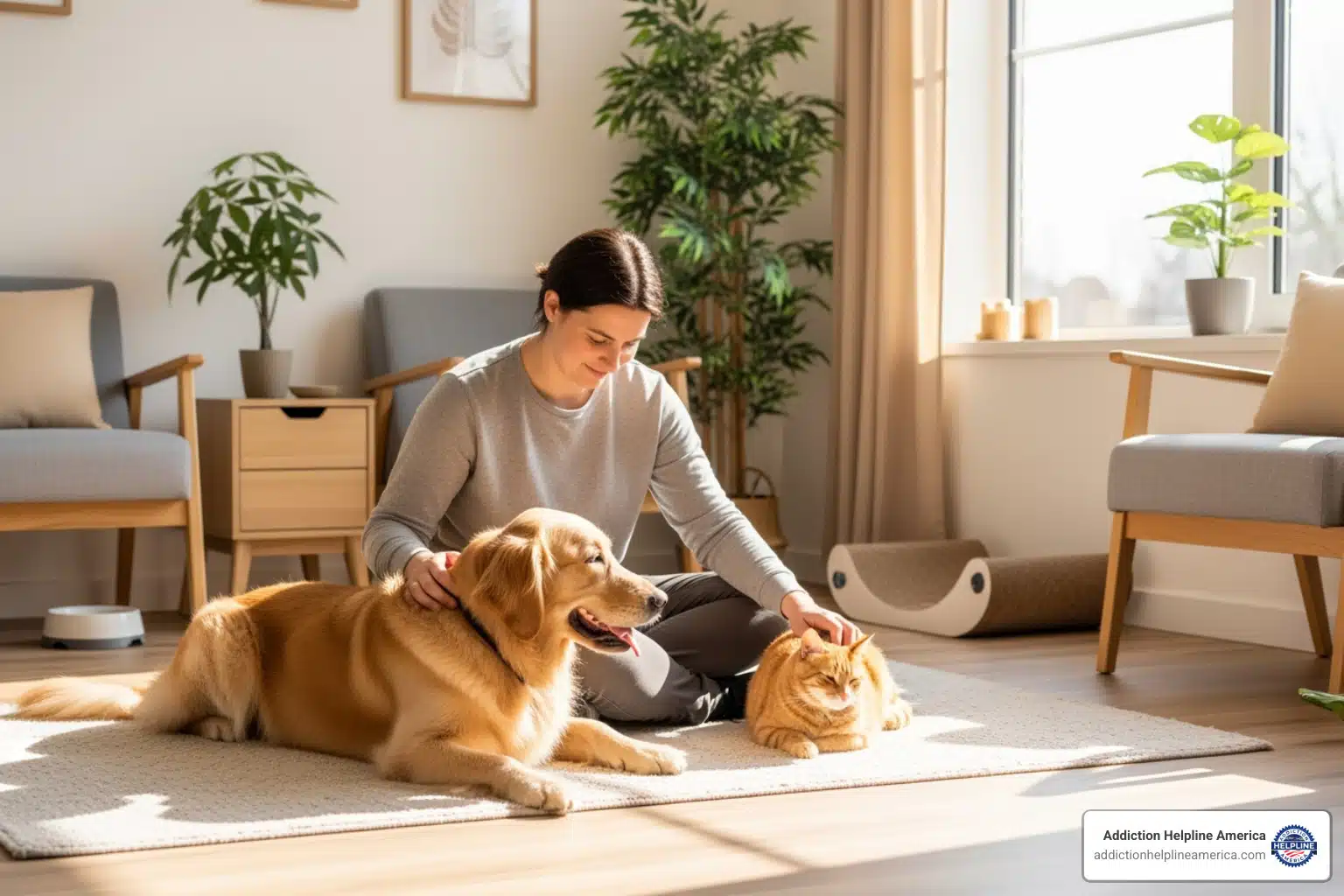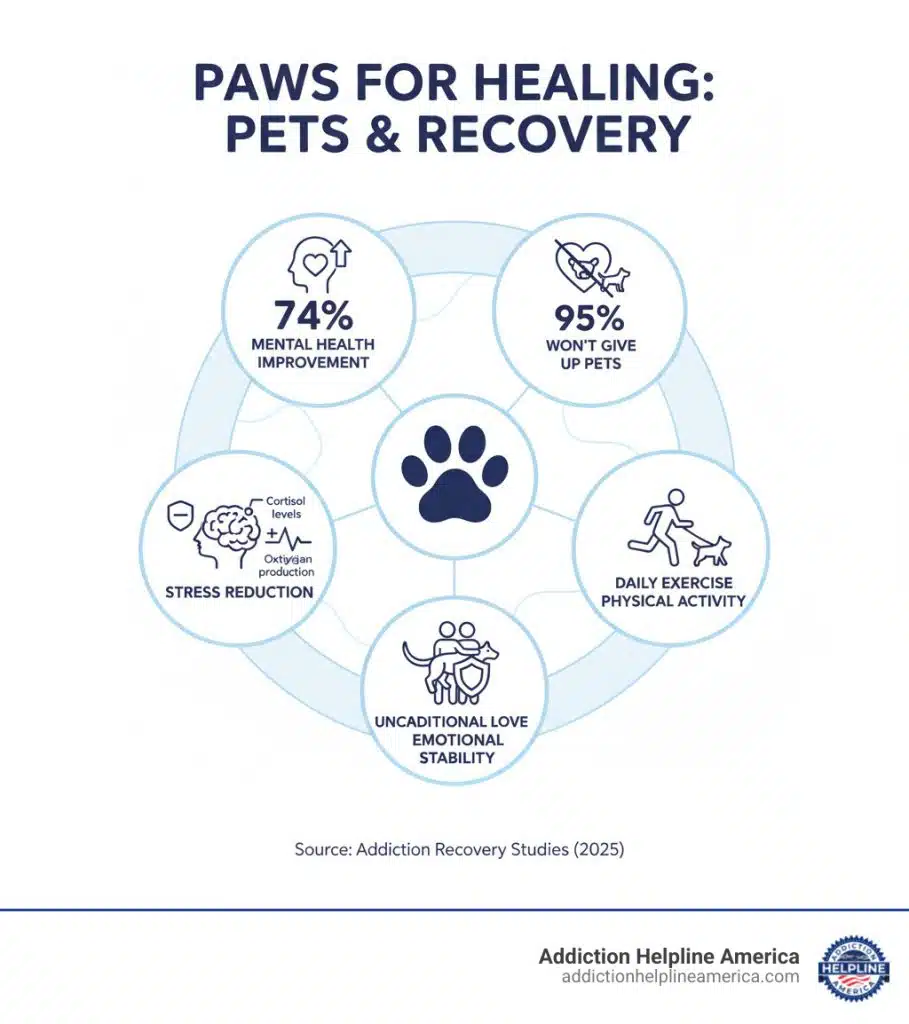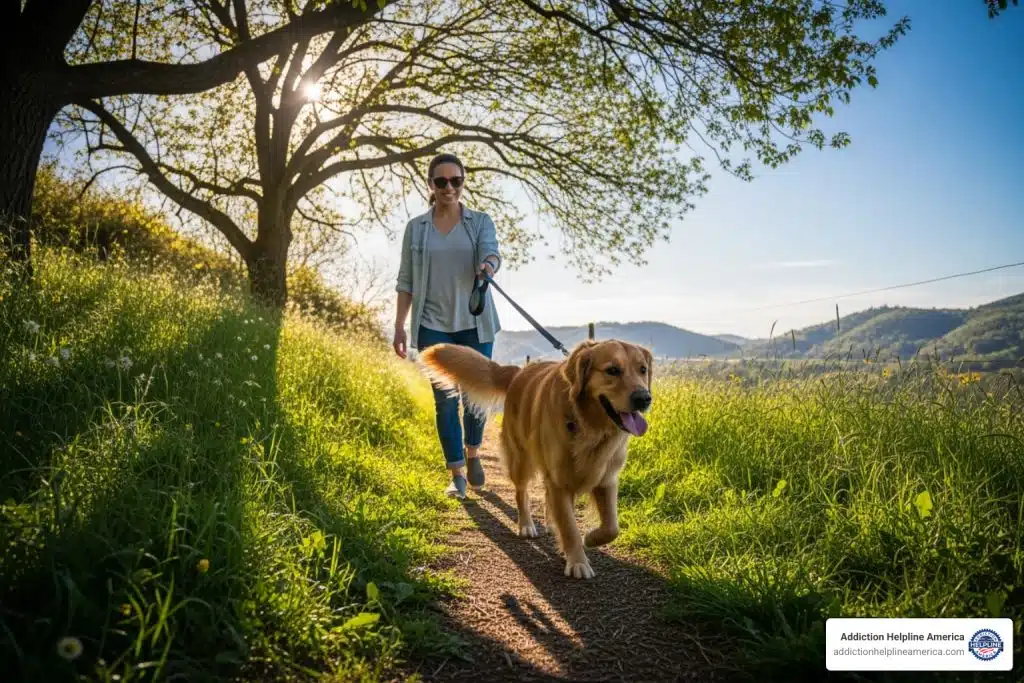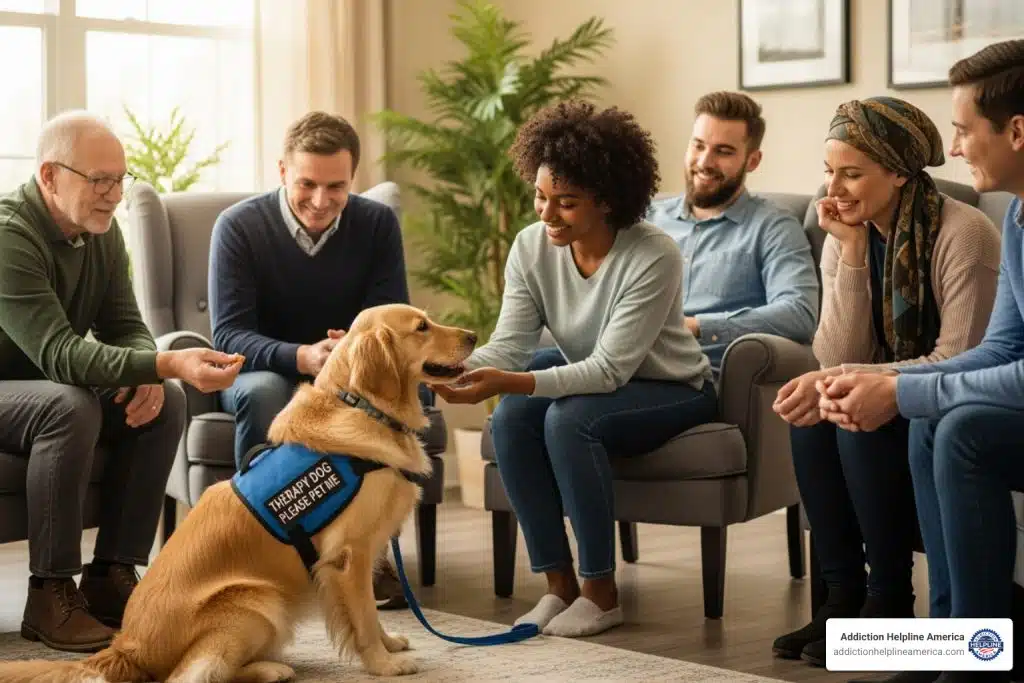
Why Your Best Friend Should Join Your Recovery Journey
Pet friendly alcohol and drug rehab centers understand that leaving your beloved companion behind can be one of the biggest barriers to seeking treatment. Here’s what you need to know:
Top Pet-Friendly Options:
- Dogs and cats are most commonly accepted (up to 60 lbs in many facilities)
- Private rooms typically required for pet owners
- Additional costs range from $2,500-$4,500 depending on pet size
- Current vaccinations and behavioral assessments required
- Florida, California, and nationwide options available
The fear of abandoning your pet shouldn’t prevent you from getting the help you need. Research shows that 95% of pet owners can’t imagine giving up their pets for any reason, and many people delay or avoid treatment because they worry about who will care for their animal.
Your pet provides more than companionship – they offer unconditional love, emotional stability, and a sense of purpose during recovery. Studies reveal that 74% of pet owners report mental health improvements from their relationship with their animals, making them powerful allies in your healing journey.
Whether it’s the gentle pressure of a cat purring on your chest or the accountability of daily dog walks, pets naturally provide many of the therapeutic benefits that support long-term recovery success.
At Addiction Helpline America, we’ve helped thousands of individuals find treatment options that accommodate their unique needs, including pet friendly alcohol and drug rehab programs across the country. Our team understands that recovery works best when you don’t have to sacrifice the relationships that matter most to you.

The Healing Power of Paws: How Pets Boost Recovery Success
Recovery from addiction is one of life’s greatest challenges. It takes incredible strength to face your struggles head-on and commit to healing. While therapy, counseling, and medical support form the foundation of treatment, there’s something special about having your faithful companion by your side through it all.
Pet friendly alcohol and drug rehab centers recognize that your four-legged family member isn’t just a pet – they’re a powerful ally in your recovery journey. The emotional, mental, and physical benefits pets provide can make a real difference in how well treatment works and how sustainable your recovery becomes.
The Unbreakable Bond: Companionship and Reduced Loneliness
Recovery can feel lonely, even when you’re surrounded by caring staff and fellow clients. The weight of shame, guilt, and regret can make you feel isolated from the world. This is where your pet becomes invaluable – they offer something truly unique in the healing process.
Your pet doesn’t care about your past mistakes or judge you for the struggles that brought you to treatment. They love you exactly as you are, right here, right now. This unconditional love and non-judgmental support can be incredibly healing when you’re working through difficult emotions and memories.
A paper published in Frontiers in Veterinary Science highlights how pets offer companionship that lessens loneliness and provides nonjudgmental support. Dogs, in particular, contribute to feelings of safety and offer a calming presence that can help you feel grounded during challenging moments in treatment.
Beyond emotional support, pets give you routine and structure – two things that are often missing during active addiction. Feeding your cat, walking your dog, or simply making sure they’re comfortable creates a sense of purpose that extends beyond yourself. This responsibility can be a powerful motivator to stay engaged in treatment and committed to your recovery goals.
A Natural Antidepressant: Stress and Anxiety Reduction
Entering rehab brings its own set of stresses. You’re facing withdrawal, confronting painful memories, and learning new coping skills. Many people in recovery also struggle with anxiety and depression, which can make the process even more challenging.
Here’s where science backs up what pet owners have always known – animals are natural stress relievers. When you pet your dog or cat, your body lowers cortisol levels (your main stress hormone) and increases oxytocin production (the hormone that makes you feel bonded and calm). This isn’t just feel-good science – it’s measurable healing happening in your body.
Research indicates that people in psychiatric treatment for addiction reported significant anxiety reduction during animal-assisted therapy sessions. The calming presence of animals helps create a safe space where healing can happen more naturally.
Mindfulness – staying present in the moment rather than worrying about the future or dwelling on the past – becomes easier when you’re focused on caring for your pet. According to the Centers for Disease Control and Prevention, pets can decrease loneliness, depression, anxiety, and agitation while helping people feel less threatened by their environment.
More Than a Cuddle: Encouraging Physical Activity

Anyone with a dog knows the drill – those hopeful eyes and the leash by the door mean it’s time for a walk, whether you feel like it or not. This gentle but persistent encouragement to get moving is one of the most practical benefits pets offer during recovery.
Daily walks aren’t just about exercise – they’re about getting outdoor time, fresh air, and sunlight. All of these naturally boost your mood and energy levels. When you’re dealing with the physical and emotional challenges of recovery, this increased energy can make a significant difference in how you feel each day.
Mood-boosting exercise happens when your body releases endorphins during physical activity. These natural chemicals work like antidepressants, helping reduce cravings and improve your overall outlook. Regular movement also leads to better sleep, which is crucial for healing both your body and mind.
The beauty of pet-motivated exercise is that it doesn’t feel like a chore. You’re not forcing yourself to go to the gym – you’re simply taking care of someone you love. This shared activity strengthens your bond while supporting your improved cardiovascular health and overall recovery goals.
Even on the toughest days in treatment, when motivation is low and everything feels overwhelming, your pet still needs that walk. This gentle accountability can be exactly what you need to take that first step outside, breathe some fresh air, and remember that healing happens one day at a time.
Understanding Your Options: AAT, ESAs, and Personal Pets
When exploring pet friendly alcohol and drug rehab options, you’ll encounter several different terms that might seem confusing at first. The world of therapeutic animals includes everything from highly trained therapy dogs working alongside licensed professionals to your own beloved cat providing comfort during recovery. Understanding these distinctions will help you find exactly what you need for your healing journey.

The key difference lies in purpose and structure. Some programs use animals as active participants in your therapy sessions, while others simply welcome your personal pet as part of your support system. Both approaches offer real benefits, but they serve different roles in your recovery process.
Animal-Assisted Therapy (AAT) vs. Bringing Your Own Pet
Animal-Assisted Therapy represents the more formal end of the spectrum. This structured approach was first introduced by Dr. Boris Levinson in 1961, an American psychologist who finded these benefits somewhat by accident. His groundbreaking work, outlined in this seminal paper presented to the American Psychological Association, showed how pets could actually function as co-therapists in treatment settings.
In AAT programs, specially trained animals work directly with licensed therapists to achieve specific treatment goals. These might include reducing anxiety during group sessions, improving communication skills, or providing a calming presence during particularly challenging therapy work. The animals undergo extensive training and certification, and their interactions with clients are carefully planned and supervised.
Bringing your own pet to a pet friendly alcohol and drug rehab is quite different. Here, your furry friend serves as your personal support system rather than a therapeutic tool. Your pet provides the comfort of familiarity, unconditional love, and daily routine that can be incredibly grounding during treatment.
| Feature | Animal-Assisted Therapy (AAT) | Bringing Your Own Personal Pet |
|---|---|---|
| Purpose | Structured, goal-oriented intervention led by a therapist to achieve specific treatment goals (e.g., reduce anxiety, improve communication). | Provides general companionship, emotional support, and a sense of normalcy and responsibility during recovery. Aims to reduce loneliness and stress. |
| Animals | Specially trained and certified therapy animals (often dogs, but can include cats, horses, etc.) that meet specific health and behavioral standards. | Your own pet, which may or may not have formal training beyond basic obedience. The animal’s primary role is companion, not therapist. |
Our helpline is 100%
free & confidential
If you or someone you care about is struggling with drug or alcohol addiction, we can help you explore your recovery options. Don’t face this challenge alone—seek support from us.
24/7 Free & Confidential Pet-Friendly Rehab Helpline
Resources
Will my insurance
cover addiction
treatment?
We're ready to help
Find the best
drug or alcohol treatment
center
Are you or a loved one struggling with addiction? Call today to speak to a treatment expert.












